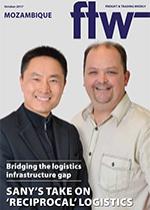One of the hangovers from the
colonial era is an historic
Portuguese penchant for red tape.
While Portugal has implemented
reforms which have seen it ranked
25th on the World Bank’s “Doing
Business” score card, Mozambique is
ranked 127th.
As one freight forwarder told FTW
“everything needs three stamps
before it can move”.
The UK Department for
International Trade warns that
challenges facing companies
trading with Mozambique include
“bureaucracy, pervasive influence of
the political elites and widespread
corruption; poor infrastructure,
resulting in higher logistical costs;
and a skills and education shortage
coupled with tightening work permit
regime”.
In November 2016 Mozambique
implemented tougher work permit
conditions for expats outside of the
oil and gas and mining sectors.
One of the conditions is that
employers who terminate the
employment of a Mozambican
national must match it by
terminating a foreign national
employee.
Individuals travelling to
Mozambique for business also
require visas. Requirements differ
from country to country.
According to the Heritage
Foundation the value of exports
and imports taken together equals
92% of Mozambican gross domestic
product. The average applied tariff
rate is 4.2%.
Import taxes and licences
No import taxes, aside from tariffs
and VAT, are imposed, except on
sugar and some luxury items.
Special import/export
requirements and certifications
All importers and exporters must be
licensed by the Ministry of Industry
and Commerce. Pre-shipment
inspections are currently mandatory
for all imports.
The importation of live animals
(other than domestic pets) requires
veterinary certificates.
Sanitary and phytosanitary
requirements exist in legislation for
the importation of foodstuffs and
plant materials.
Special import permits
and licences are necessary for
pharmaceuticals, firearms,
munitions and explosives.
Due to concerns regarding avian
influenza, there are restrictions on
the importation of live chickens
originating from countries where
there have been avian influenza
outbreaks.
All products must bear a health
certificate from the country of origin,
certifying they are free of disease, or
importers may face sanctions.
Warranty and non-warranty
repairs
Spare parts imported for repair
purposes are subject to normal
tariffs. Goods
are not normally shipped to
Mozambique for temporary repair.
Industrial free zones/
warehouses
GAZEDA (Gabinete das Zonas
Económicas de Desenvolvimento
Acelerado, Office for Economic Areas
with Accelerated Development) is
the agency responsible for developing
and managing Special Economic
Zones (SEZ) and Industrial
Economic Zones (IEZ) that offer
financial incentives and specialised
services for investors.
SEZs are intended for the
production or transformation of
goods to be sold into Mozambique
while IEZs focus on manufacturing
of goods for export.
This quick guide to import
and export rules is taken from
information provided by the US
Department of Commerce, the UK
Department for International Trade
and other sources.

